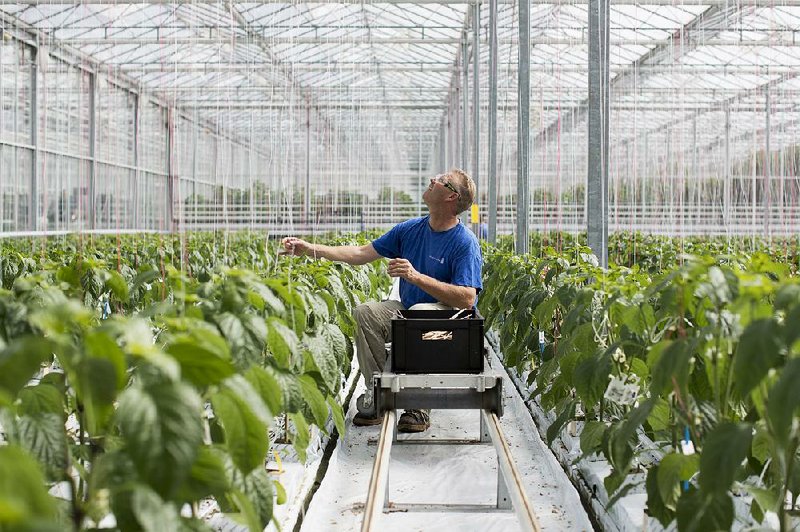FRANKFURT, Germany -- The U.S. seed-maker Monsanto agreed to a $66 billion buyout offer from Germany's Bayer in a deal that would create a global agricultural and chemical giant.
The proposed combination would create a seed and crop-chemical heavyweight with about $26 billion in sales. The deal would give Bayer, whose businesses include chemicals and pharmaceuticals, a company that's both the world's largest seed supplier and a pioneer of crop biotechnology.
The kind of genetically modified seeds that Monsanto started to commercialize two decades ago now account for the majority of corn and soybeans grown in the United States.
It was the third time in four months that Bayer returned with a richer offer to sell the acquisition to Monsanto, and hopefully, its shareholders.
Excluding debt, the deal is valued at $57 billion. If approved, Monsanto will continue to be based in St. Louis.
Bayer said Wednesday that it would pay Monsanto shareholders $128 per share -- in cash. That represents a 44 percent premium over Monsanto's closing price on May 9, the day before a proposed deal was announced.
The deal must still get approval from both Monsanto shareholders and regulators, who in the U.S. have recently rejected a pair of megadeals in the health sector.
Signaling its confidence that it would be able to push the deal through, Bayer as part of negotiations told Monsanto that it would pay a $2 billion break-up fee if it falls apart.
Bayer said the transaction brings together two different but complementary companies. Bayer makes a wide range of crop-protection chemicals that kill weeds, insects and fungus, while Monsanto is known for its seeds business and the weedkiller Glyphosate.
Bayer, based in Leverkusen, initially offered $122 per share, then $125 per share, before the companies agreed to a final per-share sale price of $128.
Monsanto Chairman and Chief Executive Officer Hugh Grant said the deal "represented the most compelling value for our shareholders, with the most certainty through the all-cash consideration."
Bayer said it would raise the cash to pay for Monsanto by issuing debt and $19 billion in equity, including a mandatory convertible bond and a rights issue.
Bayer shares rose 0.6 percent in U.S. trading Wednesday to close at at $104.85. Shares of Monsanto, which are up 8 percent this year, rose 66 cents to close Wednesday at $106.76. with Bayer at $104.85 and Monsanto.
The proposed deal is likely to spur U.S. regulators to demand the sale of some cottonseed assets to alleviate concerns that the deal could hurt competition in one of the country's largest row crops.
U.S. government data show the companies had about 70 percent of U.S. cottonseed sales last year, which means it's almost certainly an area they'll have to address. Monsanto CEO Grant said Wednesday during a conference call to discuss the deal with analysts that there's "very little overlap" with Bayer. The German company declined to discuss which assets might need to be sold in order to get regulatory approval.
Monsanto became the largest U.S. cottonseed company in 2007 with its purchase of Delta & Pine Land Co. for $1.6 billion. To satisfy antitrust concerns, Monsanto agreed at the time to sell its Stoneville Pedigree Seed unit, which had 12 percent of U.S. cottonseed sales, to Bayer for $310 million. It also agreed to divest its smaller NexGen cottonseed brand.
In a sign of just how protracted the antitrust review will be, the companies said they will seek approval in 30 jurisdictions around the world, including the U.S., European Union, Canada and Brazil, and don't expect to close until the end of 2017.
European Union Competition Commissioner Margrethe Vestager said the goal is to ensure farmers "enjoy affordable prices, choice and not to be locked in with just one provider."
Antitrust officials will have to consider not just each deal individually, but how all the deals combined would affect markets, said Elai Katz, an antitrust attorney at Cahill Gordon & Reindel LLP in New York.
"Whenever we think about merger review, it's always about the future. You're imagining what will the world look like after this merger," Katz said.
Information for this article was contributed by David McHugh of The Associated Press and by Jack Kaskey and David McLaughlin of Bloomberg News.
Business on 09/15/2016
